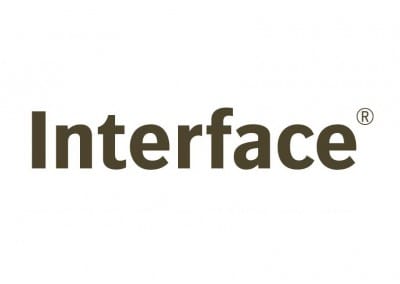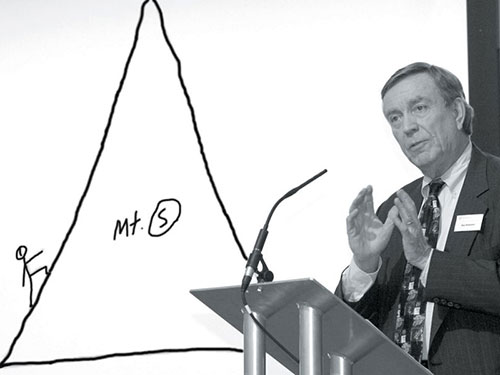 About Interface
About Interface
Interface® is the worldwide leader in the design, production and sale of environmentally-responsible modular carpet for the commercial, institutional and residential markets. It was in 1973 when Ray C. Anderson recognised the need for flexible floorcoverings for the modern office environment.
In the mid-1990s, Interface’s Chairman and CEO Ray C. Anderson shifted the company’s strategy, aiming to redirect its industrial practices to include a focus on sustainability without sacrificing its business goals. To read more about his vision, please have a look at Interface’s journey to sustainability here.
Since its founding, Interface has grown into a billion-dollar corporation. It has diversified and globalised its businesses, with sales in 110 countries and manufacturing facilities on four continents, and is now the world’s leading producer of soft-surfaced modular floorcoverings. During the past three decades, Interface has received recognition and many awards for its efforts to make their own organisation truly sustainable and inspire others to do the same.
About the project
The challenge
For 21 years Interface operated instinctively on the traditional industrial model of “take-make-waste”, being heavily reliant on fossil fuels for their products, transportation and manufacturing. The turning point came in 1994 when a series of events led Ray C. Anderson to realise how little attention was being paid to the future and the leading role the company could play in carving a new path, aiming towards a more sustainable industrial model and society. Interface wanted to show that if even a company that depends extensively on oil can transform itself, then any business can do it and no one will have an excuse not to do it.
The result
Interface has successfully dispelled the myth that focusing on sustainability negatively affects the bottom line. If anything, they have proven exactly the opposite. From 1996 to 2013, Interface reduced the manufacturing waste it sends to landfill by 84 per cent. About 49 per cent of all raw materials are now either recycled or bio-based, including 36 per cent of yarn and 51 per cent of carpet backing. Savings from avoided waste costs amounted to $450 million. In terms of energy, total energy use at the global factories has been reduced by 39 per cent per unit. Also, 36 per cent of energy consumed globally is from 100 per cent renewable sources (with 7 out of 9 facilities operating with 100 per cent renewable energy). Greenhouse gas emissions have been reduced by 41 per cent.
The Natural Step’s work
Interface became the first US Company to adopt The Natural Step’s Framework. Under the guidance of The Natural Step and other sustainability visionaries, the new Interface vision was created, using the metaphor of Mount Sustainability defined by the four principles of The Natural Step.

“Mission Zero™” was crafted to eliminate any negative impact Interface has on the environment by 2020, showing that it’s possible to create a better world and be restorative through the power of one’s own influence. Interface included aspects from The Natural Step’s Framework in the company’s strategic planning process and all employee training. Ray Andersen: “As we climb Mount Sustainability, with the four Sustainability Principles at the top, we are doing better than ever on bottom line business.“ Gradually, the Framework became a vital and visible part in the company’s operations and culture, and it was consistently positioned as providing the most rigorous definition of sustainability.
Mission Zero™
Eliminate waste
Benign emissions
Renewable energy
Close the loop
Efficient transport
Sensitising stakeholders
Redesign commerce
A video and Selected quotes
The “Business Case for Sustainability” explained by Ray C. Anderson, founder of Interface and until his death in 2011 a long-term partner of The Natural Step.
Shaping the future
Ray C. Anderson wrote multiple books including the bestselling reference book “Confessions of a Radical Industrialist”. He featured in several documentaries and films, such as “The Corporation” in 2004 and “The 11th hour” in 2007, and gave a talk at TED Global. He received numerous awards including 12 honorary doctorates and TIME’s Hero of the Environment in 2007. He served as co-chair of President Clinton’s Council on Sustainable Development. Since his death in 2011, the Interface organisation has continued the challenge to achieve its mission by 2020. In 2011, The Natural Step colleagues wrote this case study on Interface, it can be downloaded here. More about the next ambitious step in the journey, Climate Take Back, still informed by The Natural Step principles, can be found here.
- Reduction in manufacturing waste going to landfill 84%
- Total recycled or bio-based raw materials 49%
- Reduction in greenhouse gas emission 41%
- Reduction in total energy use at global factories 36%
Do you want to know more about us?
Are you curious to learn more about our offerings?
